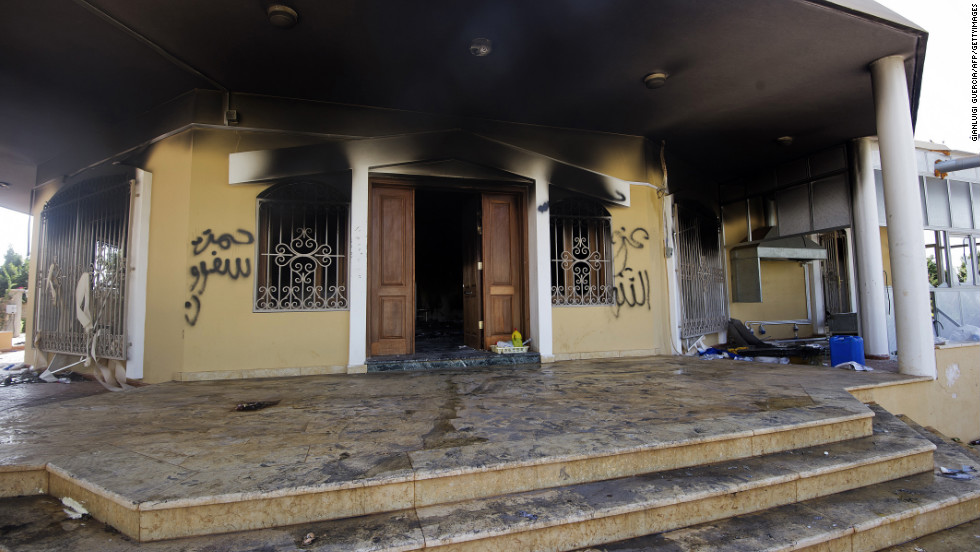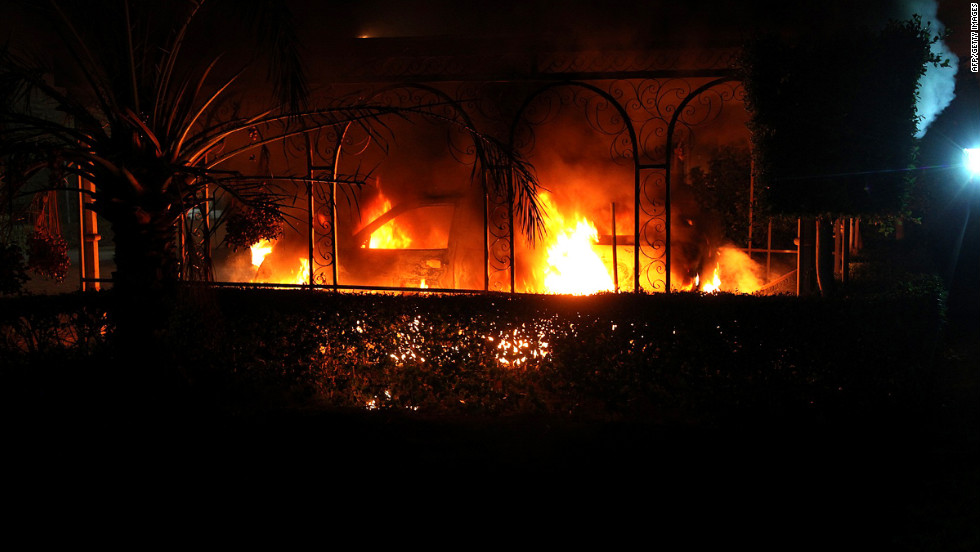Story highlights
- Ambassador Stevens was frustrated with the weak police and security forces
- The "security vacuum" around Benghazi was a consistent theme in the cables
- Rep. Darrell Issa, R-California, released the documents Friday
- Rep. Elijah E Cummings, D-Maryland, accuses him of political motives
A diplomatic cable sent by Ambassador Chris Stevens from Benghazi hours before the attack on the U.S. Consulate that killed him was largely devoted to the rising security threats in and around the city.
The cable, sent to the State Department, was released Friday by the chairman of the U.S. House Oversight and Government Reform Committee, Rep. Darrell Issa, R-California. It is among more than 160 pages of documents that paint a picture of persistent and unpredictable violence in and around Benghazi this year and an often fractious debate about resources for diplomatic security.
In the September 11 cable, the ambassador refers to a meeting nine days earlier in which the commander of Benghazi's Supreme Security Council "expressed growing frustration with police and security forces" being too weak to keep the country secure.
Another paragraph refers to the "expanding Islamist influence in Derna," a town east of Benghazi, amid reports linking "the Abu Salim Brigade with a troubling increase in violence and Islamist influence."
The Abu Salim Brigade was prominent among the opponents of former strongman Moammar Gadhafi.
The ambassador refers to another meeting on September 9 in which commanders of unofficial militia claimed that the Libyan Armed Forces depended on them to secure eastern Libya, and even supplied them with weapons.
The previous weekly report from Benghazi also referred to the "security vacuum," a consistent theme in the cables. In August, Stevens sent a cable titled "The Guns of August: Security in Eastern Libya."
He said the "absence of significant deterrence has contributed to a security vacuum that is being exploited by independent actors. ... Islamic extremists are able to attack the Red Cross with impunity."
"What we have seen are not random crimes of opportunity but rather targeted and discriminate attacks."
His final comment in the two-page document was: "Attackers are unlikely to be deterred until authorities are at least as capable."
A broad-ranging survey of security issues across Libya written in June included a section titled "Foreigners also increasingly targeted." Referring to an earlier attack on the U.S. Consulate and other incidents that month, it said a Libyan official believed the "attacks were the work of extremists who are opposed to western influence in Libya."
The documents released also cover an often contentious dialog between security officers and Washington over security arrangements in both Tripoli and Benghazi.
In February the regional security officer in Tripoli, Eric Nordstrom, warned that having just two diplomatic security agents on the ground in Benghazi meant that movements outside the consulate were impossible.
"I've been placed in a difficult spot when the ambassador tells me I need to support Benghazi," Nordstrom wrote February 12 in an e-mail to James P. Bacigalupo, regional director of the Near East Affairs Department.
Last week in testimony before the House Oversight Committee, Nordstrom referred to a phone conversation -- also in February -- in which he was apparently talking with Bacigalupo.
"I said, 'Jim, you know what makes it most frustrating about this assignment? It's not the hardship, it's not the gunfire, it's not the threats; it's dealing with and fighting against the people and programs who are supposed to be supporting me.
"And for me the Taliban is on the inside of the building," he added.
In a separate memo earlier in February, Nordstrom had warned that "al Qaeda-affiliated groups, including al Qaeda in the Islamic Maghreb (AQIM) and other violent extremist groups are likely to take advantage of the ongoing political turmoil in Libya."
In the spring and summer, at least three further cables were sent requesting security resources be reinforced for the embassy in Tripoli and consulate in Benghazi. But in July, Stevens noted that "under current arrangements (the) post's 34 U.S. security personnel ... will draw down to 27 on 7/13."
Stevens expected a further drawdown in August "with a further reduction to 7 U.S. security personnel on 08/13.'
On August 2, the embassy requested 11 extra bodyguards at an annual cost of some $330,000 to "fill the vacuum of security personnel ... who will be leaving within the next month and will not be replaced."
"The security situation in Libya remains unpredictable, volatile and violent," the cable adds. "Host nation security support is lacking and cannot be depended on to provide a safe and secure environment."
A week before the consulate attack, the weekly report from Benghazi noted that at last "police have established a 24/7 presence at the mission in response to our long-standing request."
That presence appears to have evaporated on the evening of September 11.
The release of the documents by Issa has brought a sharp rebuke from the senior Democrat on the House Committee, Rep. Elijah E Cummings, D-Maryland.
"To issue such a contorted and incomplete account of events three days before the upcoming presidential debate undermines the legitimacy of the committee and the credibility of its work," Cummings wrote in a letter to Issa.
Cummings said that both Nordstrom and Under Secretary of State for Management Patrick Kennedy had told the committee that on the night of the attack there were five Diplomatic Service agents in Benghazi -- one more than Nordstrom had requested in July.
Cummings also noted that "Nordstrom also stated emphatically that the "vast majority" of his resource requests were "considered seriously and fastidiously by (Diplomatic Security) and the department."






















































